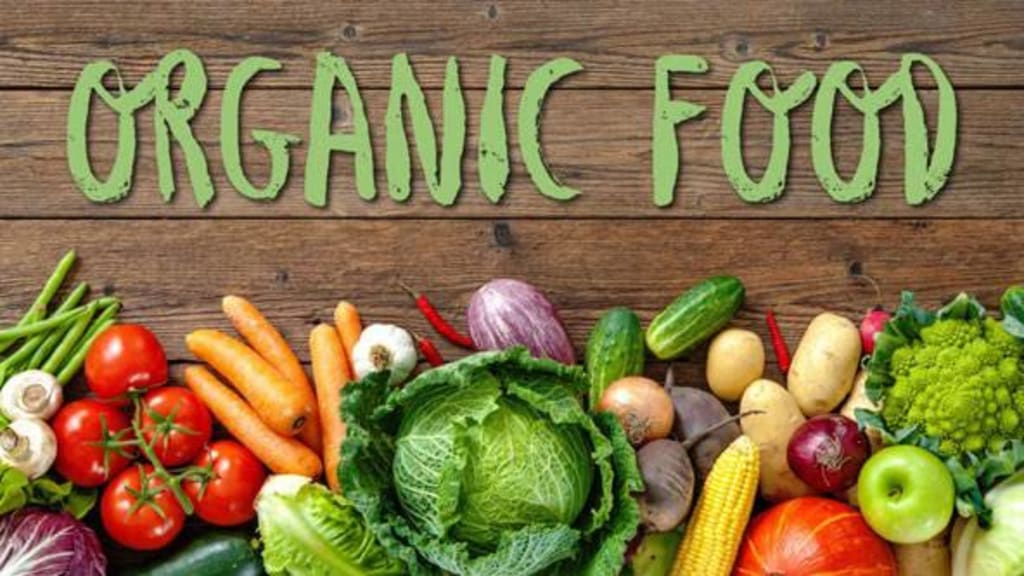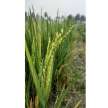ORGANIC FOOD
The benefits of organic food for the environment and health

Organic food is grown without the use of synthetic pesticides, fertilizers, or genetically modified organisms (GMOs). This means that organic food is often considered to be healthier and more environmentally friendly than non-organic food.
The benefits of organic food for health:
• Fewer pesticides: Organic food is produced without synthetic pesticides, which can be harmful to human health if consumed in large quantities.
• More nutrients: Some studies have found that organic food contains higher levels of certain nutrients, such as vitamin C and antioxidants, compared to non-organic food.
• No antibiotic resistance: Organic farming prohibits the use of antibiotics in animals, reducing the risk of antibiotic resistance.
The benefits of organic food for the environment:
• Reduced pollution: Organic farming methods reduce the amount of pollution caused by synthetic pesticides and fertilizers.
• Soil conservation: Organic farming practices help to conserve soil and improve its health by using methods such as crop rotation and composting.
• Biodiversity: Organic farming promotes biodiversity by not using synthetic pesticides and by using natural methods for pest control.
• Climate change: Organic farming practices can help to reduce greenhouse gas emissions and store carbon in the soil.
It's worth mentioning that some studies have not found significant differences in nutrient content between organic and non-organic foods, and more research is needed to fully understand the health benefits of organic food.
Some of the best organic foods to include in a healthy diet include:
• Fruits and vegetables: Organic produce is free from synthetic pesticides and fertilizers, making it a healthier option.
• Whole grains: Organic whole grains such as quinoa, brown rice, and oats are a great source of fiber and other essential nutrients.
• Nuts and seeds: Organic nuts and seeds such as almonds, chia seeds, and pumpkin seeds are rich in healthy fats, protein, and other nutrients.
• Legumes: Organic beans, lentils, and peas are a great source of plant-based protein and fiber.
• Dairy products: Organic dairy products such as milk, cheese, and yogurt come from cows that are not given antibiotics or growth hormones.
• Meat and poultry: Organic meat and poultry come from animals that are raised without the use of antibiotics and growth hormones, and are fed a diet free from genetically modified organisms (GMOs)
• Seafood: Organic seafood is caught or farmed without the use of synthetic pesticides or fertilizers, which makes it a healthier option for both the environment and for human consumption.
It's Important to note that organic foods can be more expensive than conventional foods. And it’s not always possible to find or afford organic options. When buying organic, prioritizing the produce with the highest pesticide residue and those that you consume the most of, like berries and leafy greens, is a good way to balance your budget and health concerns.
Here are some tips for choosing and storing organic produce:
• Choose produce that is in season: Organic produce that is in season is often fresher and more flavourful. It also tends to be less expensive than out-of-season produce.
• Look for signs of freshness: Choose produce that looks firm, is free from bruises or blemishes, and has a vibrant colour.
• Check for certifications: Look for the USDA Organic seal or other certifications to ensure that the produce is truly organic.
• Wash produce before storing: Rinse produce under running water before storing, even if you plan to eat it later.
• Store produce properly: Some fruits and vegetables give off ethylene gas which can cause other produce to ripen too quickly. To prevent this, store ethylene-producing fruits and vegetables separately from ethylene-sensitive produce.
• Keep produce dry: Excess moisture can cause produce to rot, so be sure to dry produce thoroughly before storing it.
• Use proper storage containers: Use airtight containers or plastic bags with small holes to allow for proper air circulation.
• Keep an eye on expiration dates: Be aware of when your produce is going to expire and plan to eat it before it goes bad.
By following these tips, you can help ensure that your organic produce stays fresh and flavorful for as long as possible.
The cost of organic food is generally higher than non-organic food due to the increased cost of production, such as using natural methods to control pests and weeds instead of synthetic pesticides and fertilizers. Additionally, organic farmers have smaller yields, which can also contribute to higher prices. However, the availability of organic food has increased in recent years, and it can now be found in many supermarkets and grocery stores, as well as at farmers’ markets. Some specialty stores and online retailers also offer a wider selection of organic products.
Pros of organic food include that it is free from synthetic pesticides and fertilizers, may have higher nutrient content, and supports sustainable farming practices. Cons of organic food include that it can be more expensive and may have a shorter shelf life compared to non-organic food. It also may be difficult to find in certain areas.
The use of genetic engineering and other technologies in organic farming is a topic of ongoing debate within the organic farming community.
• On one hand, some argue that genetic engineering and other technologies can help organic farmers increase crop yields and reduce dependence on synthetic pesticides and fertilizers. For example, genetic engineering can be used to create crop strains that are resistant to pests and diseases, which can help reduce the need for pesticides. Additionally, precision farming technologies can be used to optimize crop growth and water usage, which can increase yields and reduce the environmental impact of farming.
• On the other hand, many organic farmers and advocates argue that the use of genetic engineering and other technologies is incompatible with the principles of organic farming. They argue that organic farming should focus on using natural methods to improve crop yields and protect the environment, rather than relying on technology. They also believe that genetic engineering and other technologies can lead to the loss of biodiversity, and may have negative impacts on human health and the environment.
• The use of genetic engineering is prohibited in organic farming by the USDA National Organic Program (NOP) standards. It means that food labeled as organic cannot be produced using genetic engineering.
• The use of precision farming technologies, however, is allowed in organic farming as long as they’re not harmful to the environment and the organic integrity of the farm and the food produced is preserved.
The role of government In promoting and regulating organic farming.
• The role of government In promoting and regulating organic farming varies by country. In general, governments play a role in setting standards for organic farming, providing financial and technical assistance to farmers, and promoting consumer awareness of organic products.
• In the United States, the United States Department of Agriculture (USDA) has the primary responsibility for promoting and regulating organic farming. The USDA’s National Organic Program (NOP) is responsible for developing and enforcing national standards for organic farming and food production. The NOP sets standards for the use of synthetic pesticides, fertilizers, and other inputs, as well as for the handling, processing, and labeling of organic products.
• The USDA also provides financial and technical assistance to farmers through programs such as the Organic Agriculture Research and Extension Initiative (OREI) and the Organic Certification Cost Share Program (OCCSP). These programs provide funding for research on organic farming methods, as well as assistance with the costs of certification.
• In addition to the USDA, other government agencies also play a role in promoting and regulating organic farming. For example, the Environmental Protection Agency (EPA) is responsible for regulating the use of pesticides, including those used in organic farming. The Food and Drug Administration (FDA) is responsible for ensuring the safety of all foods, including organic products.
• In other countries, the role of government in promoting and regulating organic farming can be similar or different. Many of them have their own organic certification bodies and regulations. They also may have different levels of government support in terms of financial aid, research and education for farmers.
• Overall, the government plays an important role in promoting and regulating organic farming by setting standards, providing financial and technical assistance, and promoting consumer awareness of organic products. This can help ensure that organic products are safe, high-quality, and produced using sustainable farming practices.
In conclusion, organic food is grown without the use of synthetic pesticides, fertilizers, or genetically modified organisms (GMOs). This makes it a healthier and more environmentally friendly option compared to non-organic food. Organic food is also fresher and more flavorful, as it is grown in season. Choosing organic produce can be done by looking for certifications, checking for signs of freshness, and washing it before storing. Proper storage and keeping an eye on expiration dates can help to keep the organic produce fresh for a longer time. However, more research is needed to fully understand the health benefits of organic food. Overall, organic food is a great choice for those who want to support sustainable farming practices and prioritize their health.






Comments
There are no comments for this story
Be the first to respond and start the conversation.